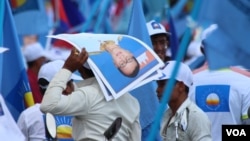A coalition of around 21 non-governmental organizations expressed serious concern over the political persecution and violence against former officials and supporters of the disbanded Cambodia National Rescue Party (CNRP).
CHRAC, which is an umbrella organization of 21 Cambodian NGOs, released a statement on Thursday calling the arrests and violence “severe and continuous.” The arrests and interrogations are linked to opposition leader Sam Rainsy’s purported plan to return Cambodia on November 9, ending more than four years in exile.
“CHRAC is very worried about these cases of violence, which occurred as political tensions [are high] in Cambodia,” read the statement. “CHRAC is also deeply concerned about people’s right to freedom of expression and assembly in Cambodia.”
The group pointed to four specific cases of recent political violence against former members and employees of the CNRP, which was dissolved in 2017. The four people, living Phnom Penh, were brutally beaten with metal pipes, causing severe head injuries in some cases. CHRAC said the police have not opened an investigation into the attacks nor have any of the perpetrators been arrested.
The NGO coalition called on the government to ensure the safety of the Cambodians engaging in political activity and lessen the environment of fear prevailing in the country.
Since August, the government has charged around 40 people linked to the CNRP for allegedly plotting a coup. Even before Sam Rainsy’s announcement of a November return, at least 120 opposition-linked individuals were questioned by courts and police officials in April and May, for supporting a potential return by the opposition leader.
The arrests and political harassment come amid an ongoing monitoring and investigation period initiated by the European Union over trade privileges afforded to Cambodia through the ‘Everything But Arms’ scheme.
Interior Ministry spokesperson Khieu Sopheak warned CHRAC to refrain from mischaracterizing the attacks on the four former CNRP officials, adding that they were not politically motivated.
“Please, the victims should not interpret this to be a political issue and use it as an excuse to flee the country and seek asylum in a third country,” Khieu Sopheak said.
“Don’t put the blame on the government or authorities because you created these problems yourself.”
Soeng Sen Karuna, a senior investigator with rights group Adhoc, said it was critical both major political parties find a political resolution to the recent tensions, or else risk a further escalation in violence.
“Each party would lose tolerance, resulting in fighting and creating violence that could evolve into a civil war that will drag on for years,” he said.







